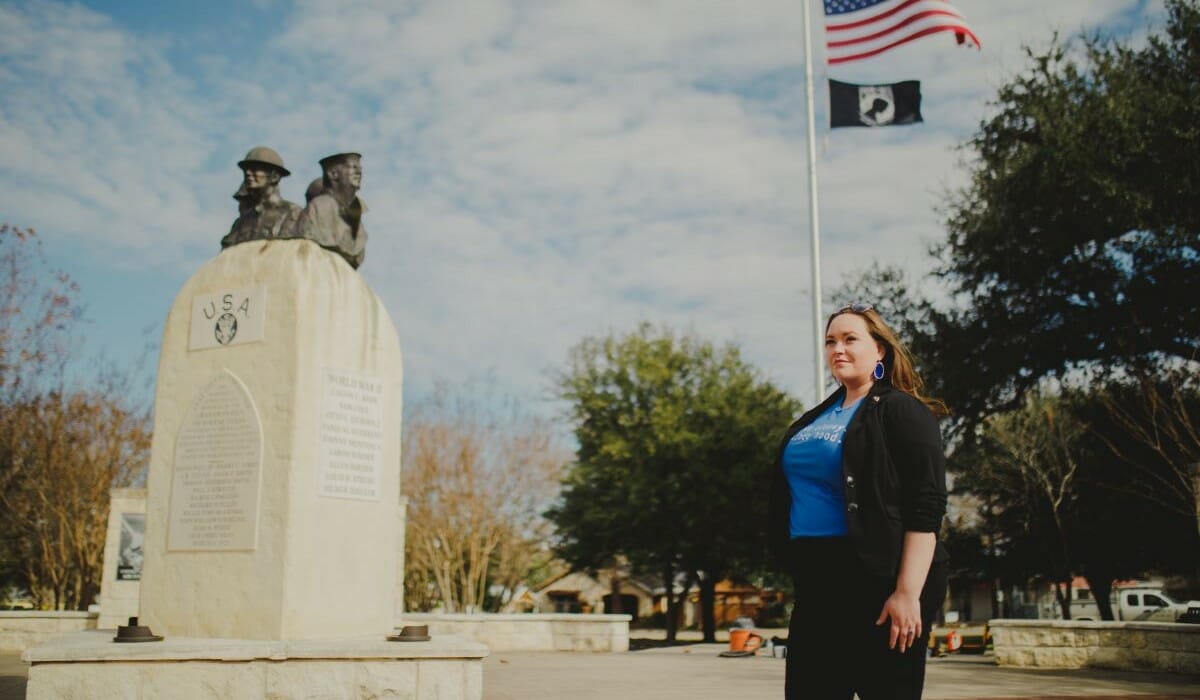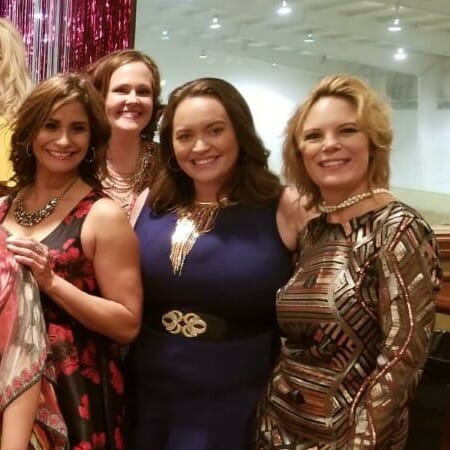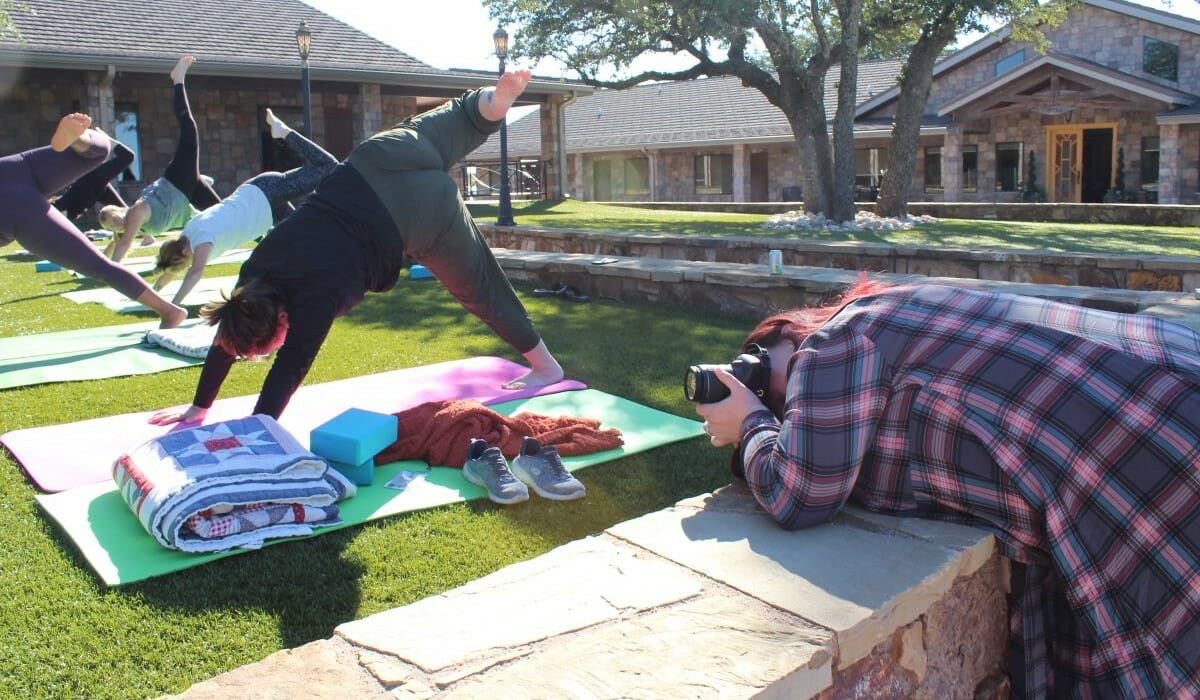Volunteer Helps Promote Therapy and Support For Fellow Women Veterans

Meet Daily Point of Light Award honoree Amber Wood Davila. Read her story and nominate an outstanding volunteer or family as a Point of Light.
After leaving the Army in 2015, Amber Wood Davila struggled to find where she fit in the civilian world. She found the sense of belonging she was seeking in The Pink Berets, a nonprofit based in the San Antonio, Texas area that supports women military veterans and first responders experiencing PTSD, military sexual trauma, and combat trauma stress. Wanting to share the healing she found from the Berets with others, Amber began volunteering with the organization in 2016.
Amber currently serves as The Pink Berets’ Chief Communications Officer, handling public relations, marketing, event coordination, and the nonprofit’s website and social media. Amber serves The Pink Berets on a daily basis, helping to share and promote the nonprofit’s therapy opportunities. Along with clinical therapy, The Pink Berets offers holistic therapeutic options such as equine therapy, culinary programs, yoga, and a wide variety of art classes.
Describe your volunteer role with The Pink Berets.
The Pink Berets is a 501(c)(3) nonprofit organization that aids and supports women military veterans and first responders with invisible injuries like PTSD, military sexual trauma, and combat trauma stress. Through our programs, we offer clinical therapy and holistic therapeutic options, so we’re healing the whole woman in an effort to return her back to the authentic life she was meant to lead. My role with the Pink Berets is Chief Communications Officer. Aside from PR, marketing, and social media management, I do a lot of event coordination, as well as assisting with a lot of the behind-the-scenes stuff, so the website and graphic design. Anything you see the Pink Berets put out in the Internet or the world has my hands in it.
What made you interested in volunteering in this way?
I am a woman veteran myself and I am a survivor of military sexual trauma. When I got out of the military, I struggled finding my footing and finding where I fit in. We spend our whole military career trying to assimilate into a man’s world, and then we get out and we don’t really fit in with our civilian women counterparts anymore either. You feel out of place wherever you go. Finding The Pink Berets, a tribe of women who had walked in my boots, allowed me to find a place to belong. It helped me with my healing. Once I found that healing, I wanted to share it with my sisters in arms, so I jumped on board to volunteer and help spread the message.
Why is it important for women veterans to have access to the types of support The Pink Berets offers?

The VA [United States Department of Veterans Affairs] offers mental health options. The difference in what The Pink Berets offers and what the VA offers is one, the VA is overburdened. It continues to be an issue and they’ve continued to work toward fixing it, but it is overburdened. Every time I tried to make an appointment with the VA, if I wasn’t in danger of harming myself, my appointment got bumped. I ended up never seeing anyone, so I was seeking additional care. That’s one reason that it’s important. They may not be receiving the care they need from the VA, so having that additional care outside the VA is helpful. The other thing is we offer holistic options, so our equine therapy, our art programs, our culinary programs. It’s those opportunities that traditional, clinical therapy doesn’t offer that helps strengthen what you’re doing in clinical therapy.
Do you have any goals or future plans you would like to see The Pink Berets achieve?
The most important thing is that when we have a woman come to our door and they have something they’re passionate about, or something that’s helping them on their journey, we’re always willing to be flexible and add new programs. We had someone who recently came to us and one of the things she found therapeutic for herself was making bracelets. She’s gone on to create a class within our art program and help others. We’re here to help you find your journey, so as far as that goes, we never know what the next program is going to come about.
As for long-term goals, I do know that we are working toward having our own space. We want to create not only a space for our programs to happen internally, but also a home to house homeless women, or women who are transitioning out of the service and don’t have anywhere to go. Homeless veterans are a huge issue in the U.S. population. What most people don’t know is more than 50 percent of homeless veterans are women veterans and many of them have children. It continues to be a rising problem. We’re working to counter that homelessness. The transitional programs we offer are focusing on helping them network, get jobs, helping them readjust to society. But also, we would like to have a space for them so we can give them a place to call home while they transition and help them heal.
Are there any future partnerships, programs, or events that you are excited about?
In February, we’re having our Beauty and Wellness event, and in March we are having our Foxhole to Fashion brunch. It’s part of our transition support program and it’s a fashion show featuring all women veterans. Our regular programs — our art, our virtual yoga, our support groups — are virtual still and in person. We have monthly photography courses, art therapy, and culinary therapy.

What’s been the most rewarding part of your work?
Every event we have, at least one woman comes up to us and says, “This was everything I needed to find somewhere I belong.” Every event, we can see at least one person realize they can find peace and they can find healing. That is everything for me. All the work, all the stress, all the long nights, early mornings, and long events, all of it is worth it if one woman finds peace and knows she can find healing.
Why do you think it’s important for others to give back?
I’m a long believer that we get back from the world what we put into it. We are blessed. It’s also our job to give back what we’ve been given. It’s a two-way street. I continue to be blessed and I continue to be given opportunities, so I try to give those back as well and put it out into the world. The Pink Berets brought me healing and brought me peace, and if I can give that to my sisters in arms, why wouldn’t I give back?
What do you want people to learn from your story?
That they’re not alone. PTSD and trauma can make you feel very alone and isolated. Even if you can’t make it to us, we have the virtual option so we can meet you where you are.
Do you want to make a difference in your community like Amber? Find local volunteer opportunities.
